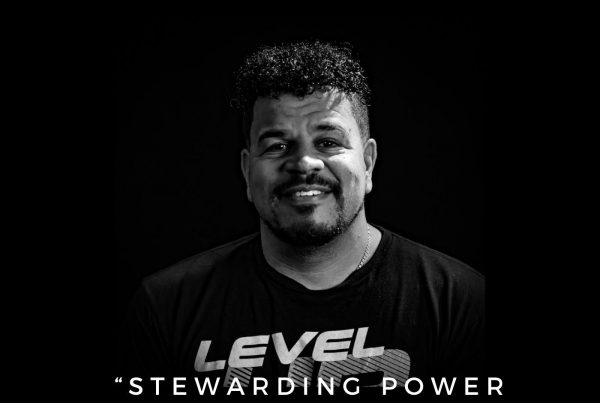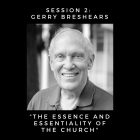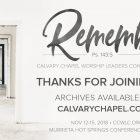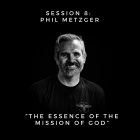Part 1
About
This presentation is two parts. The first part will focus on the Principles of Mentorship and the second part the Practices of Mentorship. Most pastors understand that the Lord has mandated us to be proactively involved in equipping the next generation of leaders but many aren’t sure how to do it effectively. The content of this presentation will give practical help to get a vital program started!
Audio Only
Part 2
Audio Only
Transcript
My name is Pastor Rod, and I’m currently serving in Montebelluna, Italy. I’m going to be doing a two-part series on developing leadership. On the first part, this one will be on the principles of leadership. The second one will be on the practices of mentorship. And so the subtitle is mentoring our replacements and the future leaders of Christianity.
I believe this is important, especially for Calvary Chapel, as we get to the place where the first generation of pastors are moving toward retirement. We need to be intentional and proactive in mentoring the young leaders that God will put before us. And so how can we transmit not only the ministry, the message that we have, but also our heart and our passions.
So those are the kinds of things that I’m going to be going over. We have a mandate from our Lord Jesus Christ, and the Great Commission. He said in Matthew 28:18–19, “All authority has been given to Me in heaven and on earth. Go therefore and make disciples of all nations.”
That’s a commandment. That’s not a suggestion. We need to be proactive in making disciples, which implies the developing of leadership.
“And he’s given some to be apostles, some prophets, some pastors and teachers for the equipping of the saints for the work of ministry.”
And so our mandate is clear, and I think if you’re watching this presentation, you probably don’t have to be sold on our mandate. You’re probably watching because you have a vision to do that, and you would like to learn a little bit more of how you can do that more effectively. So I’ll be sharing some things with you that I have gained over the years of doing internships, mentoring young people in the Bible college scene, as well as in the church. Well over a hundred, maybe up to 200 young people, have gone through our internships who are serving the Lord still in some form. Some of them are pastors, some of them are even senior pastors.
So, today the principles of mentorship. The first thing we are going to be looking at is being intentional. The second thing is being relational. And then the third thing is to be adventurous.
So firstly, to be intentional. We have to look at this and purpose in our hearts to do it. In my own experience, there’s many different reasons why I can’t do it. The biggest one is I don’t have time.
Our schedules are packed, but we need to carve out time to fulfill the mandate that Jesus has given to us: to equip saints for the work of the ministry, to make disciples of all the nations.
When you look at Jesus and His disciples, He was very intentional in His method. He wasn’t haphazard. He took these 12 men, spent three years with them and gave them opportunities to minister and equip them for the ministry as well. These men, along with the empowering of the Holy Spirit on the Day of Pentecost, were trained by Jesus to lead the church when He departed and ascended and to further the kingdom of God here on earth.
Leroy Eims of the Navigators said (The Lost Art of Disciple Making), Jesus “knew that in order for His mission to succeed, much would depend on the dedication, loyalty, courage, and faith of the men whom He had chosen and trained.”
If you look at the gospel of Mark, which is very fast paced, if you look at it from the perspective of Jesus the mentor, you can see how He trained these guys through the various activities that they were involved in.
For example, when they were trying to get rest in chapter 6, Jesus wanted to get the disciples away to give them some needed rest after they had been sent out and so forth. And then, you know the story, how the multitudes found out where they were and they followed, and Jesus saw the multitudes, and He was moved with compassion, and He went on to minister to them.
So this was a great lesson for the disciples. There’s times when we’re tired and confronted with this thing that we need to do, and we need to depend upon the power of the Holy Spirit to enable us to accomplish those things. When Jesus fed the 5,000 with five loaves and two fish, if you notice in the story, He took the bread, He blessed it, then He broke it and gave it to His disciples, and His disciples were to take it in turn and give it to the people. So Jesus incorporated His disciples into this miracle. It was an act of faith for Jesus, but it was also an act of faith for these disciples as well. They must have looked at 5,000 people holding a little bit of fish and bread as they pass it out. It was a great lesson of faith for these disciples, wasn’t it?
Remember when they were crossing the sea of Galilee and Jesus remained on the shore? He was praying and the disciples were rowing against the waves. Then Jesus appeared to them walking on the water.
Well, the disciples learned perseverance. Jesus told them to get in the boat and go to the other side. But the storm was contrary. They probably wanted to turn the boat around. They knew it was a hopeless situation, trying to make it to the other side until the winds died down. But Jesus told them to go to the other side, so they persevered. And the lesson they would have learned is that they need to persevere in the storms of life.
William MacDonald, in his commentary on the whole Bible, said this:
“Disciples of the Lord Jesus should never doubt His power to supply their needs. If he can feed 5,000 men with five loaves and two fish, He can provide for His trusting servants under any circumstances. They can labor for Him without worry as to where their food is coming from. If they seek first the kingdom of God and His righteousness, his every need will be supplied.”
And through these three years, the disciples were mentored by Jesus to learn these valuable lessons.
The second thing is to be relational. Jesus’s methodology in mentorship was foundationally relational. Jesus was with His disciples. He spent time with them on a day-to-day basis. In Mark 3:14, it says: He appointed the 12 so that they would be with Him and so He could send them out to preach.
So being with the disciples gave Him a great opportunity to teach and influence them, something that He wouldn’t have been able to do if He was aloof or distant and disconnected from them on a relational level. The times that you spend with those that you’re mentoring are going to be the times that are the most rewarding to you as well.
Again, Leroy Eims said, “When you start spending individual time with another Christian for the purpose of having a ministry in his or her life, time together in the Word, in prayer, in fellowship, and systematic training, something happens in your own life as well.”
And I’ve seen that to be true. The relationships that I’ve developed with these young people (not all of them were young) throughout my ministry, there’s still a connection. So when I see them, it’s like we have never parted. We just connect right away. We’re back to where we were—in fellowship.
And so the final thing. We want to be intentional. We want to be relational. But we need to be adventurous.
My point in this is the implication that Jesus gave His disciples the opportunity to succeed in things that He gave them to do. But with that, the implication is He also gave them things [to do] that they could fail at. For example, the failure of the disciples when they didn’t have the ability to cast out the demon of the epileptic boy in Matthew 17:14–16:
And when they had come to the multitude, a man came to Him, kneeling down to Him and saying, “Lord, have mercy on my son, for he is an epileptic and suffers severely; for he often falls into the fire and often into the water. So I brought him to Your disciples, but they could not cure him.”
So here was an instance when the disciples had this opportunity. Jesus gave them the opportunity to go out and preach and to heal and to cast out demons. They have this opportunity, and they failed. They couldn’t do it. In their failure was a great lesson that Jesus was able to teach them. In the same chapter, verses 20 and 21, Jesus said,
So Jesus said to them, “Because of your unbelief; for assuredly, I say to you, if you have faith as a mustard seed, you will say to this mountain, ‘Move from here to there,’ and it will move; and nothing will be impossible for you. However, this kind does not go out except by prayer and fasting.”
You know as well I do, some of the greatest lessons are the lessons we learn through failure. And so the people that we’re mentoring, we have to give them real opportunities, real possibilities for success and real possibilities for failure.
And when they do make mistakes, when they do fail, and it’s going to happen, those would be the lessons that will probably stick with them throughout their ministry, the things that they will learn from the most, just as we have.
Part two will be the practices of mentorship. God bless you.

Rod Thompson was saved in 1985 at Calvary Chapel Costa Mesa and in 1990 God called him to serve at the Calvary Chapel Conference Center in Millstatt, Austria. For 15 years, he and his family served on the mission field in various places in Europe. Then in 2005, the call came for them to move to Murrieta, California, where Rod served as the director of the Calvary Chapel Conference Center and as the pastor of a local church called Cross Culture Ministries. He and his wife moved back to Europe in January 2019 and entered into full-time missionary service, full of vision and expectation for God to do great things.
























My team is eating this up… it’s so good